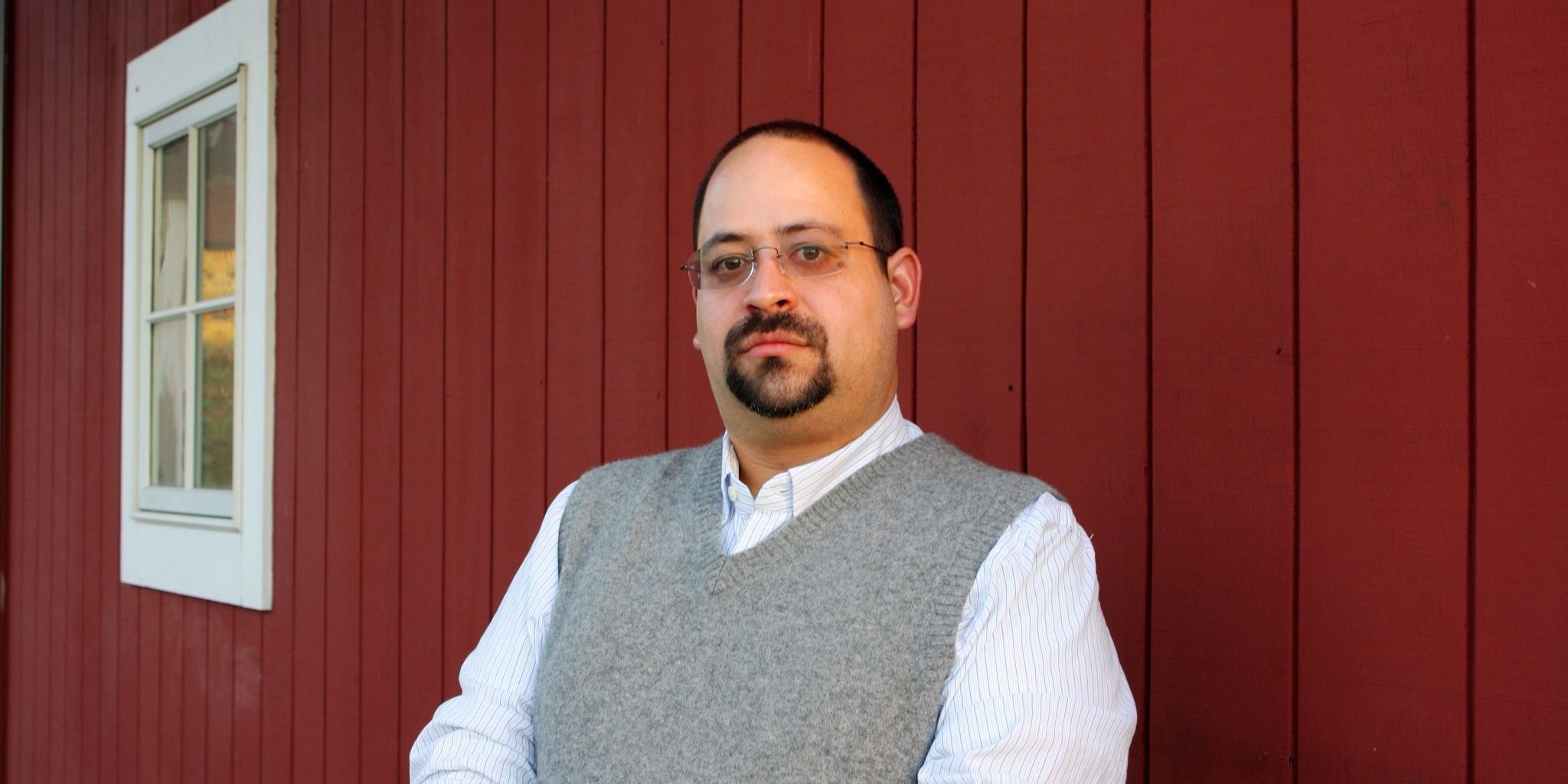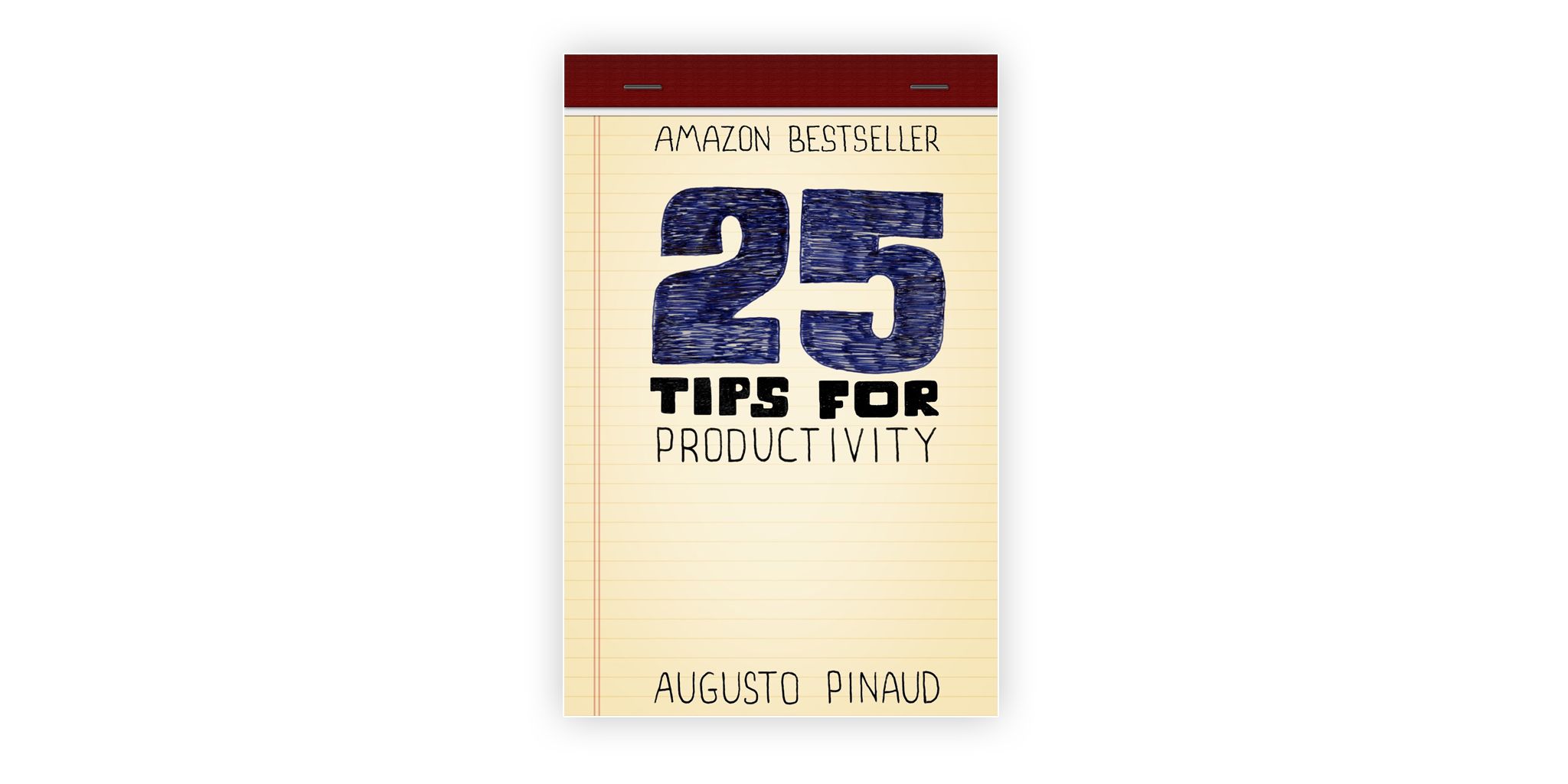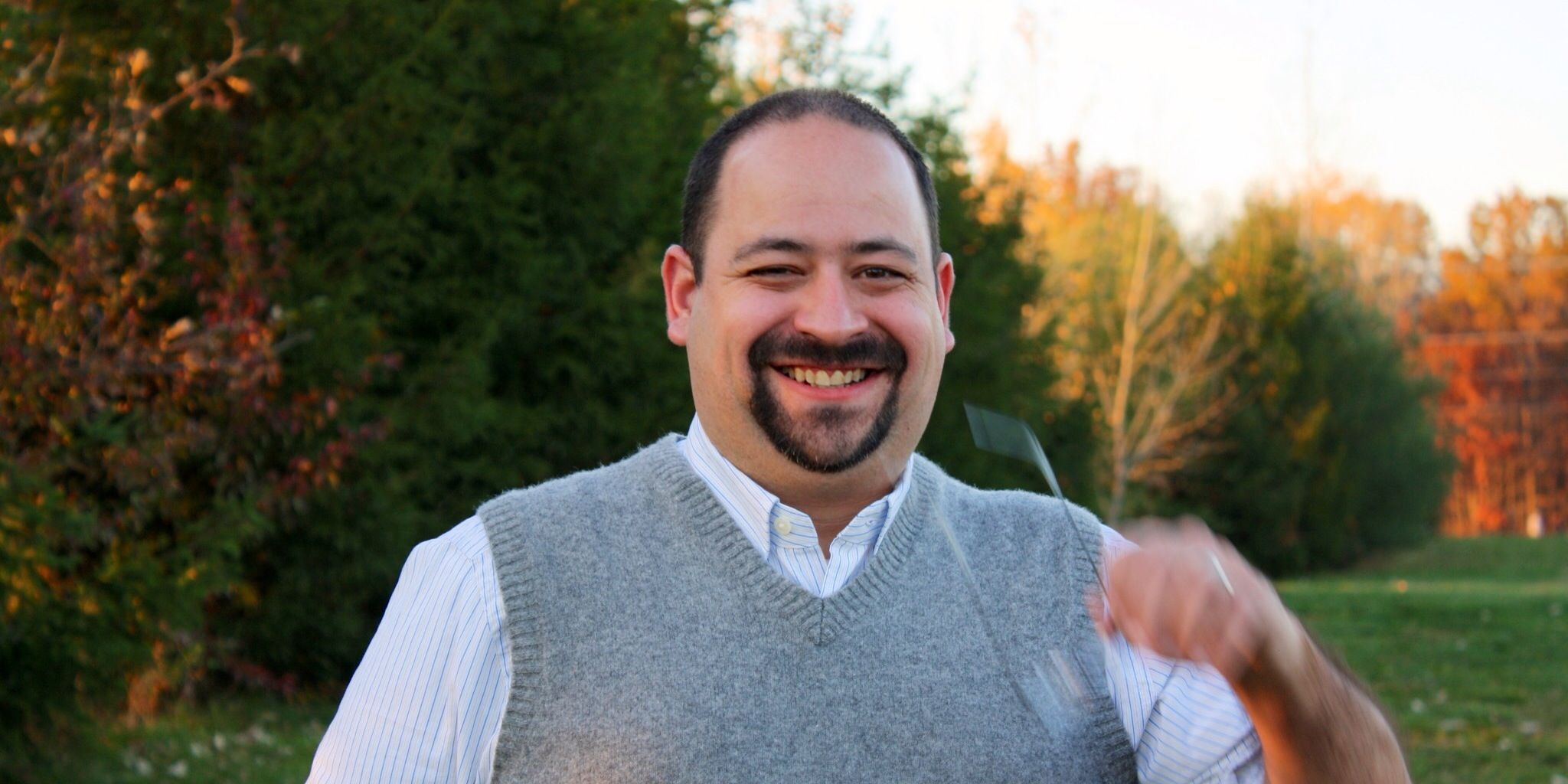Interview with Augusto Pinaud
Augusto Pinaud: I’m a writer. I spend most of my time writing about productivity and writing fiction. Productivity is one of the things I need most. I have been spending quite an amount of time learning how to be more effective, how to save minutes in order to save hours.
Michael Sliwinski: I got to know you because we are both passionate about GTD (Getting Things Done) and we participate in a virtual GTD study group. Recently you self-published a book “25 Tips for Productivity” and it’s only in ‘e’ version, so you can get it on Kindle from Amazon, right?
Augusto: At least until December the e-version is exclusive from Amazon. In the USA it is in paperback at both Barnes&Nobles and Amazon, however, the paperback is only available from Amazon in the rest of the world.
Michael: I just read the book. I really love it. It’s very down to earth, 25 really cool tips.
Augusto: Actually, I did two experiments with this book. This is the first book that I wrote in Spanish first, which is my primary language, and then I translated it into English. The other two (fiction books) I wrote in English.
The idea was to write a really fun book to read. The first draft came in just a week. I started on a Monday and by Friday afternoon I had the first draft. It was a rough first draft but it was just a first draft. It happened very, very fast and was really fun to create.
Michael: I know for a person like yourself, who read “Getting Things Done” many years ago and implemented most of it, you mention that in your book many things become common sense for you, become logical things. And I like the chapter in your book where you question common sense, because, what is common sense for you - doesn’t mean it is common sense for everyone, right?
Augusto: Yes, I make that point and I have been saying it for years - common sense is the most uncommon of the senses actually. :-)
If you touch, and everybody can touch, everybody has a feeling, has the same feeling of touching, but when you talk about common sense, common sense really depends on your experience. Even if you mention the book “Getting Things Done” there is a part in the book where David Allen, the author, said himself that all these principles are just common sense and I always chuckle at that part. To tell you the truth, it’s common sense after you apply these methods.

I remember to this day, the first time I read about the “two minute rule”. My reaction to the two minute rule was something like “Why have I never thought about this? It’s fantastic!” And if you would ask me today, yes it is common sense but back in 2003 when I read the book the first time — it wasn’t.
Michael: Another point that you make in the book is related to the video which I posted a few months ago on my Productive! Show. I showed how I can type without watching the keyboard or the screen, really fast. I thought it was common sense, I mean everybody knows that you should learn how to touch type, right? But after the video many people approached me to say: “Yeah, I think I should learn this”. And you also mentioned that learning to type is the essential skill for everyone right now.
Augusto: Well, the reality is, good or bad for all of us, is that we are sitting in front of a computer at least 70% of the time. And when I wrote that chapter I had a conversation with a friend of mine, whom I had sent this chapter to, and he told me “Well, you know what is interesting, is that when you talk about typing with people everybody thinks they type faster than what they actually do.” That’s the reason I put it in the book.
Go online and take a free test of your speed, you will be impressed. The first time I did it, I was shocked. And people think that because they only do little things on the computer they don’t need to type faster. Or they think they can type with two fingers and go faster. Trust me, I did too. I resisted learning to type for many years because if I’d only type five lines, where was the need to type faster? After I learned and improved my speed, it was really a night and day difference.
I also mention in the book, when I got an iPad and realized I can only use it with a keyboard and I thought…if I’m only going to use the iPad with a keyboard… what is the reason to have an iPad instead of a laptop…and I was at the point of getting rid of mine when a friend pointed out…“Why don’t you get a typing tutor for the iPad? There is an app for that!” Again one of those common sense things, right? I got the app!
Do I type fast on the screen of the iPad? Not yet. I type at 60—65 WPM (Words Per Minute). I understand for a lot of people that’s incredibly fast, but I can do 85—90 on a regular keyboard, but this is at least a speed that I can work with. When I did the first typing test on the iPad it was 15 words per minute… so now I’m more than 4 times faster!
Michael: When I made the switch to the iPad I was trying to simplify my set up and I’ve been commenting about this on my blog, how this simplification influenced other areas of my life. You also dedicated several chapters to simplifying in your book. I’d say I enjoy embracing minimalism, to have as little clothes as possible, as little things in the office as possible. I really like your message there to really simplify things and to have a “not-to-do list”, right?
Augusto: Not to have and not to do. You know, I’m careful with the use of the word 'minimalism’ because there are a lot of people who are going to the extreme. If it works for them, that’s great, but I think that because of that extreme many people who read this might walk away from minimalism.

I believe people should simplify, I believe that you should get rid of most of the junk you have accumulated over the years, and it was actually Patrick Rhone who used the word ‘Enough’. And the first time I heard it, it became common sense to me. I said, ‘that’s exactly what I want.’ It is not an extreme minimalism, I don’t want to go to the extreme like the people who have 30 items. I just want to have exactly what I need and no more.
It’s been a difficult process because you are trained as a kid and growing up to collect stuff. Because, in a way, collecting stuff is a symbol of status. Hey, if you have three cars it means you made it!
There are people who can live with two pairs of shoes and there are people who need five and those are both correct answers. The question is, what is your correct answer and after you discover what it is then aim for it and try to get there.
The “not-to-do” list follows the same path. There are a lot of things that that we do that we shouldn’t — period. For example, I’m now working on redesigning the blog and the web-page. Could I spend the time and money to learn Wordpress well in order to do something that looks decent? The answer is yes. But how many hours is that going to cost me? In my case, an incredible amount. But what if instead of that, I hire someone and use my saved time to write? How about that? There are things you should not do.
I also mention reading. I love to read. I have a yearly goal of reading more than 52 books. I have made myself this goal since 2008 or 2009. Every year I read at least 52 books. And one of my rules is that if I’m reading a book and I don’t like it, I drop it. If I get to a certain point and it’s always around 20% of the book and I don’t get into the book then I drop it. I even encourage people if you get my books and you are 10%, 15% or 20% into the book and you don’t enjoy it, drop the book. Don’t finish reading it. It’s not worth it. There are so many good books out there, why are you going to waste hours of your time on something that is not worth it?
Michael: I’m totally with you on this one. And there is some advice that you give in your book for people who travel or just move between office and home office for example, about chargers and other accessories — that we should buy more of them, right?
Augusto: You will hear the following complaint “oh, you know, I don’t have time, I really need two hours more in the week” The thing is, people look at their calendar and their list and their stuff… and they are trying to see how they are going to find two more hours to save. In my experience, you are never going to do that. But if you look into the small things you will find those two hours just by saving minutes here and there. We have just been talking about typing, right? If people double their typing speed the amount of time they will save is incredible. It is the same thing with many things you use on a daily basis.
I always had a computer charger in my office, a computer charger in my home office and a computer charger in my bag. Always. Why? Because believe it or not, those five minutes it takes to get down on your knees and get down under the desk to plug the computer charger and later unplug it… and you do it several times a day… When you add the two minutes you need in the morning to the two minutes you need to go home that’s four minutes a day. Ok? If you work 5 days a week that’s 20 minutes and assuming you don’t do it at home. If you do it at home, that’s 40 minutes. If you noticed, we are almost at 50% of those two hours we just mentioned. And there are so many other things like that!
The other thing is email. In all of my email messages it says on the bottom 'Sent from my iPhone’. And it’s there regardless if I send it from my Mac, iPad or the iPhone. The reason is simple: when I send you an email with this signature and I send you just two lines of text you won’t think anything of it. You received an email that reads it came from the phone and you are OK with the fact that the email is short. If you don’t have that, people will assume you sent it from a computer and if you send the same short email that was fine a minute ago, now that email is rude because it’s too short.
Michael: Exactly, people can be offended, because on the computer your email signature can be bigger than the content of the email, right? I also like what you said about the ritual that you have for your “Weekly Review”. You have your special type of coffee there and everything. I read something about this theory of small victories. When you manage to achieve a “small victory”, and then another, you get the momentum and when you get the momentum, you get things done.
Augusto: I’ve been doing that ritual for years. It’s a Venti coffee from Starbucks, I only get it when doing my weekly review. If it happens that I do another weekly review during the week I get that same kind of coffee. I do rituals with a lot of things, because I have discovered that they help me get in the mood much faster. A lot of people have rituals, some of them conscious, most of them are not. If you learn to identify what they are, making your rituals conscious, you are going to be able to get in the mood much faster.
It’s like people who do exercise, I had a friend who would leave work in his gym clothes. What happens is that he drops into gym much more often than before. Usually when going home from work he’d say: “I’m going to stop at the gym” and then in the middle of the way he’d go “Oh, I’m tired, I’ll go to the gym tomorrow”. Now that he started dressing up in his workout clothes and drives with his sneakers on, he said that he’s improved on stopping at the gym by more than 50%. The barrier of entry is lower now that he’s dressed and he goes: “Well, you know I can go now for 5 mins” and that is his trick.
It is something simple, a little ritual, but those tiny tricks really make a huge difference. I have been a big proponent of the iPad as my main machine and one of the fun changes I’ve made when writing is that I only write in plain text. Why? It is simple, if I open a laptop and I open Word or Pages, I start looking at the italics, settings and margins. I waste an incredible amount of time on this instead of writing. With plain text I do not have that option.
Michael: It’s just PLAIN text…
Augusto: Exactly, just plain text. So my options are: to write or not to write. With this simple trick I’ve been able to double my output on writing. And that was my goal.
Michael: Thank you Augusto! For many more small tips that will help you work more effectively and get more things done check out Augusto’s book “25 Tips for Productivity” on Amazon.


